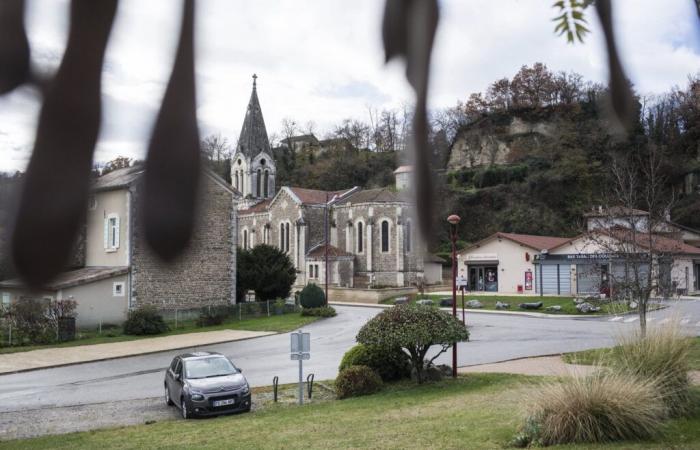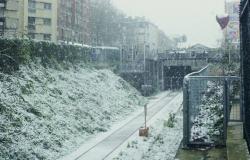
Crépol (Drôme), special envoy.
On the heights of Crépol (Drôme), in the bends which lead to the small Saint-Roch chapel, the road is barely cut to allow its green tractor to pass. Maurice Hugues, 71, is proud of his machine. He could talk about it for hours. From its date of manufacture (1963!), from its peasant grandfather who left it to it, from its imperfect conduct…
Then, without transition, the one who has also been municipal councilor of this commune of 528 inhabitants for thirty-one years and member of Lutte Ouvrière points out the landscape: “You know that Nathalie Arthaud was born there? » We didn’t know that, no. Crépol is not exactly known for this, since last year and the death of Thomas, 16, stabbed on the night of November 18 to 19, 2023 during a ball.
At the mention of the tragedy which propelled this commune into the media storm, far from the peaceful days he hoped to spend on his small farm in Drôme, Maurice closed down. “That’s tricky. If I talk about it, what will you say? They all came and reported anything: BFM, Europe 1, CNews… I call them “ChiéNews » me anyway. So, we no longer prefer to talk about it too much. » Maurice, however, wears a faded t-shirt which displays a message of another order: “Express yourself! »
Instrumentalization of the far right
At the heart of the commune, we find this same reluctance everywhere. Behind the tobacco bar with the lowered grille, two dilettante women pretend to have “a lot of work”. In front of the deserted tennis court, a lady of a certain age mimes sudden hearing problems, well after the start of our exchange.
“We have to understand, it was very violent for all of us herei, continues Maurice Hugues. The media and certain politicians wanted to make Thomas’ death a symbol of French fractures without even being interested in our reality..
In question, the disclosure by the far right of the origins of certain suspects and their place of residence: the popular Monnaie district of Romans-sur-Isère, 17 kilometers from here. Elements immediately relayed by the reactionary media, to the point of turning it into a national debate around an alleged conflict between two Frances. The one from the countryside, allegedly the victim of a crime « antiblanc ». And that of the neighborhoods, necessarily threatening because it is racialized.
“We are losing our young people”
“We know very well that this is not a crime of this orderdefends the municipal elected official. It’s a fight that has degenerated between young people on edge, increasingly uninhibited by violence, and who no longer hang out enough to not challenge each other on the rare times they cross paths. »
At the exit of the village supermarket, one of the few shops in the area, Sophie, who works with young people in a specialized structure, says: “That there were racist words exchanged on one side or the other is possible. Between the young people of the villages of Drôme des Collines and those of the districts of Romans-sur-Isère, a gap has opened up. But not to the point of killing each other. »
“We are losing our young people, deplores a village figure. On both sides, they make the other responsible for all the difficulties” she continues. In Crépol, between the legislative elections of 2022 and 2024, the vote in favor of the National Rally (RN) was multiplied by three. La Monnaie prefers massive abstention.
A “disgusting recovery”
Hafid, 50, an IT technician at the Valence hospital center, knows this Romans district like no other. He grew up there, left, then came back. “By attachment. » With him, there is no need to contort yourself. The death of Thomas and his attempt at political recovery come immediately.
“When I learned what happened, I was devastated and revoltedhe confides. He’s a young man from our area, I don’t make any difference from those in the neighborhood. Except that we were deprived of our mourning to designate us as guilty. » When he says « on »Hafid aims “the fascists of all France”. Those who are “captured the antenna” to pour out their anger against immigration.
And those who organized and carried out a racist raid in the neighborhood a few days later, on the pretext that certain suspects were from there. “The right reaction to this tragedy would have been to ask “why?” » and then to work together, villages and neighborhoods, so that this no longer happens, he assures. But this disgusting recovery wanted just the opposite. »
So, “why?” “. We walk alongside him through every street in the neighborhood, from the towers to the market, which he describes as the ” heart “ and the ” lungs “ of the Mint. The first are dilapidated, the second depopulated. Boulevard Dunant, he stops abruptly. In front of him, an abandoned playground filled with very old children. Above their heads, an inscription: “You have arrived. » “There, when I was young, it was a school, he remembers. Now it’s a deal point. »
“Young people are under house arrest and what they are”
Opposite the Totem tobacco bar, we meet Moussa, 38 years old, a former judo champion who now teaches his discipline to younger people. Nostalgia strangles them. Thanks to the protection of childhood, the social center, or the associations, now literally reduced to rubble, both were able to participate in carnivals, Olympics, and even ski outings involving young people. neighborhoods and villages. A social crossroads that no longer exists. Only one neighborhood house survives.
“Everything wasn’t perfect, but we had friends from everywhere, different, says Moussa. Now, our young people are under house arrest and what they are. » The fault lies in the withering away of the associative fabric, in the desertion of public services – as a symbol, no more buses have passed through the neighborhood recently. And to the progressive reduction of the field of possibilities.
In Drôme, the unemployment rate stands at 8.2%, compared to 6.4% for the rest of the region. Moussa breathes: “It’s unfortunate, the outside world doesn’t want to know them and they are so wary of them that they sometimes have a knife on them. »
© Joris Chateau
Even sports clubs can do nothing against this compartmentalization. “They have long been vectors of diversity. Today it’s the opposite, regrets David Buisson, coach at RC Romans-Péage, Thomas’ rugby club. Young people from the villages go to rugby and those from the neighborhoods to football. And when they arrive at the Dauphiné high school, where they are supposed to meet, it’s too late. They identified their peers and others. »
Rebuild society
Following the Crépol tragedy, however, several initiatives were launched to bring them to “form a society together”. David Buisson, for example, organized a weekend bringing together fifteen young people from the rugby club and fifteen others from the football club.
“From the following training sessions, I no longer heard the same things, he assures. The other was no longer a distant stranger, it was this friend with whom they had played for two days. » In schools, participatory workshops against racist stereotypes were organized in partnership with stakeholders from villages and sensitive neighborhoods.
For its part, the local popular education association L’Ébullition has embarked on the harvest of “portraits of women” de la Monnaie and elsewhere to establish a dialogue between the different daily newspapers. It is also for this purpose that an event “of peace” is preparing at La Monnaie in collaboration with associations in Crépol.
He will pay tribute to the memory of Thomas, but also of Nicolas, 22, a player from the same rugby club, killed during a shooting outside a nightclub in Valencia at the end of October. And another young person, whose death made little noise. Zakaria, 15, stabbed at La Monnaie last April. His fault: having intervened in a fight that did not concern him to protect Mathieu, 14 years old.
“The goal of the far right is to make us believe that we are two distinct groups and that our interests diverge. Except that we suffer from the same ills and that we all have as many interests in living well, together”insists one of the organizers. It remains to rebuild bridges.
Before leaving, one last thing…
Unlike 90% of French media today, Humanity does not depend on large groups or billionaires. This means that:
- we bring you unbiased, uncompromising information. But also that
- we don’t have not the financial means that other media benefit from.
Independent and quality information has a cost. Pay it.
I want to know more





